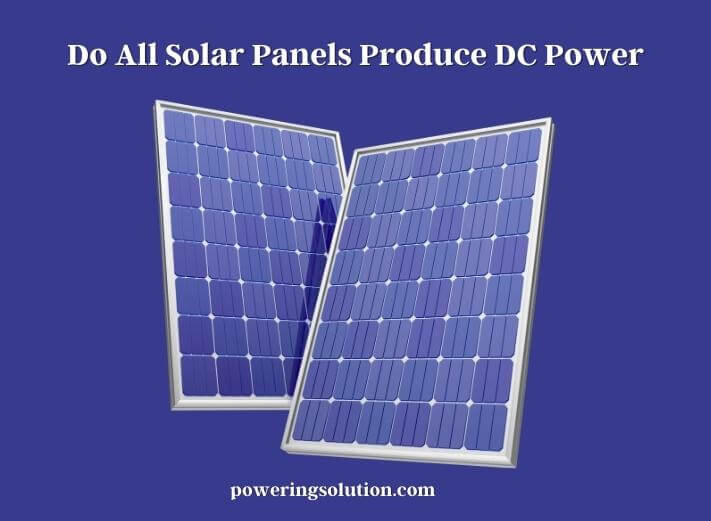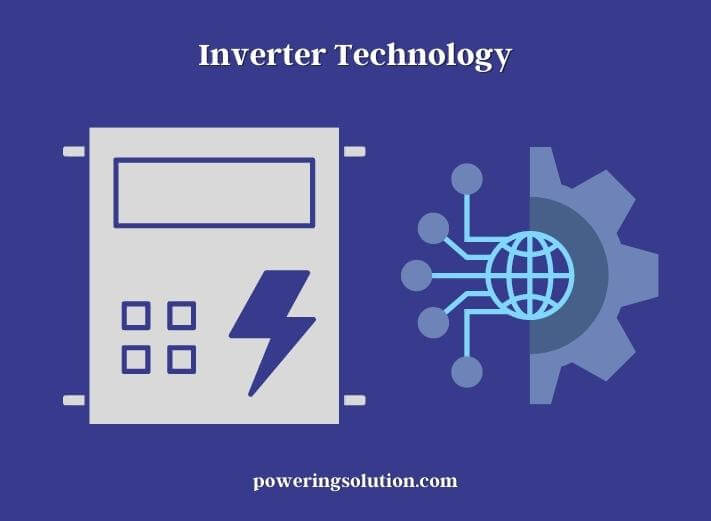As the world shifts towards renewable energy sources, solar panels are gaining more attention and popularity as a sustainable and environmentally-friendly way to generate electricity. Solar panels harness the power of the sun to produce electricity that can be used to power homes, businesses, and other appliances.

Many people are still unsure about how solar panels work and whether they always produce DC power. This is an important question to answer because understanding the difference between DC and AC power is crucial to making informed decisions when choosing solar panels. In this article, we will provide a comprehensive answer to this question and explain the difference between AC and DC power.
Understanding DC Power
Direct current (DC) power is the type of electricity produced by solar panels. DC power flows in a single direction, from negative to positive, and is typically used to power small electronics, such as cell phones and laptops. The advantage of DC power is that it can be stored in batteries, making it ideal for off-grid systems.
DC power is produced by solar panels when photons from the sun’s light hit the panel’s photovoltaic (PV) cells. The PV cells are made up of semiconductor materials, such as silicon, which absorb the photons and release electrons. The flow of these electrons creates an electrical current that is in DC form.
DC power has several advantages over AC power. One of the main advantages is that it can be stored in batteries, making it an ideal choice for off-grid systems, such as remote cabins or camping sites. Additionally, DC power is more efficient than AC power because there are fewer energy losses during transmission. However, DC power is not suitable for powering most household appliances, which require AC power.
DC power is the type of electricity produced by solar panels. It flows in a single direction and is typically used to power small electronics. DC power is more efficient and can be stored in batteries, making it ideal for off-grid systems. It is not suitable for powering most household appliances, which require AC power.
The Need for AC Power
While DC power is the type of electricity produced by solar panels, most household appliances, and electronics require alternating current (AC) power to operate. AC power is the type of electricity that is supplied to homes and businesses through the power grid.
The main advantage of AC power is that it can be easily transformed into different voltages, making it suitable for a wide range of devices. Additionally, AC power is more efficient for long-distance transmission and can be transmitted at higher voltages, which reduces energy losses during transmission.
To use solar power to operate household appliances and electronics, DC power must be converted to AC power through a device called an inverter. The inverter takes the DC power produced by the solar panels and converts it into AC power that can be used by most household appliances and electronics.
It is important to note that not all solar panels produce DC power. Some newer solar panel technologies, such as thin-film solar panels, can produce AC power directly without the need for an inverter. However, these types of solar panels are not as efficient as traditional silicon-based solar panels, and they are not yet widely available on the market.
While most household appliances and electronics require AC power to operate, solar panels produce DC power. To use solar power to operate household appliances and electronics, DC power must be converted to AC power through an inverter. While newer solar panel technologies can produce AC power directly, they are not yet as efficient as traditional silicon-based solar panels.
Details About Inverter Technology
Inverter technology is an essential component of many modern appliances and systems, from air conditioners and refrigerators to solar power systems and electric cars. In simple terms, an inverter is an electronic device that converts DC (direct current) electricity into AC (alternating current) electricity.

Inverter technology has revolutionized the way we use and consume electricity. Before the advent of inverters, many electronic devices, such as air conditioners, refrigerators, and washing machines, were only able to operate on AC power. This meant that these devices required a steady and reliable source of AC electricity to function properly. However, with the advent of inverter technology, many of these devices can now operate on DC power, which is more efficient and easier to store.
Inverter technology has also played a critical role in the development of renewable energy sources, such as solar power. Solar panels produce DC power, which is then converted into AC power using an inverter. In the past, this conversion process was not very efficient, resulting in energy loss and reduced overall system performance. However, with advances in inverter technology, modern solar power systems can convert DC power to AC power with up to 98% efficiency, making solar power a much more viable and attractive option for homeowners and businesses alike.
Another important application of inverter technology is in electric cars. Electric cars use batteries to store DC power, which is then converted into AC power using an inverter to power the car’s electric motor. The inverter plays a critical role in managing the flow of power from the battery to the motor, ensuring that the car operates efficiently and smoothly.
Inverter technology has also had a significant impact on the efficiency and performance of air conditioning systems. Traditional air conditioners operate on a binary principle, turning on and off to regulate the temperature in a room. However, inverter air conditioners use variable-speed compressors and motors, which allow them to adjust the cooling output to match the cooling demand of the room. This results in significantly higher energy efficiency and cost savings compared to traditional air conditioners.
Inverter technology has had a transformative impact on many aspects of modern life, from the appliances we use in our homes to the renewable energy systems that power our cities. With continued research and development, inverter technology is likely to become even more efficient and versatile, paving the way for a cleaner, more sustainable future.
Do All PV Panels Produce DC Power?
While most PV panels do produce DC power, there are some exceptions to this rule. Some PV panels are designed to produce AC power directly, without the need for an inverter. These panels are known as AC modules or AC panels. AC panels have an inverter built into the panel, which converts the DC power produced by the cells to AC power.
There are also hybrid panels that can produce both DC and AC power. These panels have a built-in inverter that allows them to produce AC power directly. They can also be connected to a battery bank, which allows them to store excess energy for later use.
In general, however, most PV panels produce DC power. This DC power is then sent to an inverter, which converts it to AC power that can be used to power homes and businesses.
Final Words
While most PV panels do produce DC power, there are some exceptions to this rule. Some PV panels are designed to produce AC power directly, without the need for an inverter. These panels are known as AC modules or AC panels. AC panels have an inverter built into the panel, which converts the DC power produced by the cells to AC power.
There are also hybrid panels that can produce both DC and AC power. These panels have a built-in inverter that allows them to produce AC power directly. They can also be connected to a battery bank, which allows them to store excess energy for later use.
In general, however, most PV panels produce DC power. This DC power is then sent to an inverter, which converts it to AC power that can be used to power homes and businesses.

Reputation management is the strategic process of influencing public perception of a company or person.
It involves continuously tracking what is being discussed about you on the internet.
The primary aim is to highlight positive content and address any negative comments or reviews.
This frequently includes engaging with customer reviews on various websites.
https://www.mapleprimes.com/users/8226mary
A vital part is managing search engine results for relevant queries.
Effective reputation management helps build credibility and protect a strong brand image.
Ultimately, it is an crucial strategy for any modern business or public figure.